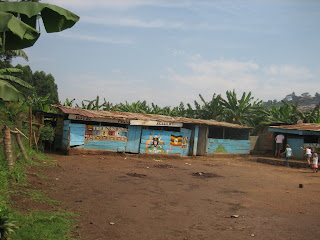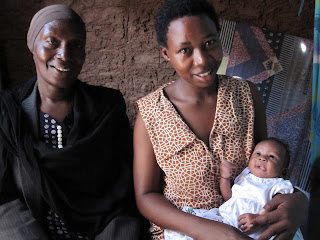This is the blog for Rhona and Bobby Hogg's VSO experience in Uganda. In August 2008 we applied to do VSO and, following an assessment day in London last October, we were accepted as volunteers . Because of the strong Scottish links, we had set our sights originally on Malawi where we spent a week in June 2008 but joint placements are difficult to find and in February we agreed with VSO to open up the search. At the end of March we were delighted to be offered placements in Kampala, Uganda. We are to work for a HIV and AIDS initiative called Reach Out Mbuya (http://www.reachoutmbuya.org/) where, we hope, Rhona's community nursing experience and Bobby's IT experience will prove useful.
We are due in Kampala on 18th September and have committed to spend a year there. We are very excited about the prospect of living in a very different part of the world and working with Ugandans who, from many reports, are fun to be with. We expect there to be many challenges but our stay in Uganda should be immensely enjoyable.
We are indebted to VSO for giving us this opportunity. Our preparation, including 2 training courses in Birmingham, has been excellent and we are confident about the in-country support that we will get from VSO in Uganda. I understand that it costs VSO around £15,000 to support each volunteer. If you would like to make a donation to support our placements in Uganda please visit the Just Giving site through the link opposite.
Tuesday, 17 August 2010
The Royal Pride Academy
The last of our scheduled visitors departed on Thursday. We had an enjoyable time with my sister, Anne, and her husband, Wofgang who live in Germany. They were with us for 2 weeks on their first visit to Africa and experienced the chaos of Kampala traffic as well as the abundant wildlife and the friendly Ugandans.
Before we left last September a number of our friends gave us money to put to a "good cause". If you have read many of our blogs you will realise that we are aware of too many good causes in Uganda and choosing one has been difficult. However there is a primary school not far from where we stay (on the other side of Mutungo Hill).
The Royal Pride Academy has 200 primary school children with seven teachers for the classes P1 to P7. It is a private school (no funds come from the government) and is dependent on the fees paid by parents. Although the government has introduced universal primary education, the reality is that in most places, including Kampala, there are no state-funded schools and many children do not attend school. The school is located in a slum area of Kampala so the concept of a private school in the UK couldn't be further removed. The school has little resources apart from the dedicated head, Godfrey, and his staff who we think receive no pay.
You will see from the photos that the buildings are basic.
The school is at the foot of the hill and until recently the classrooms were regularly flooded. The partner of one of the volunteers recently organised the builiding of the concrete plinths to keep the classrooms above water level and the chute and roundabout were provided by another volunteer.
It is likely other funds will be given to improve the buildings so we are adding our contribution to this. We hope those who gave us money to use in Uganda will feel that this is a worthwhile project.
On another note, we were delighted to hear yesterday from our younger son, Hamish, that he and Morven are engaged. With David and Kelli's wedding next spring, 2011 should be an exciting year.
Sunday, 15 August 2010
Health Visiting African Style
Most of my time and energy has been focused on increasing Reach Out’s research capacity and capability.
For the last few weeks of my placement I am concentrating on helping to develop better care of our babies born to HIV women. Although Reach Out seems to provide, in African terms, a Rolls Royce service to their clients, there is little monitoring of the babies in the Prevention of Mother to Child Transmission (PMTCT) programme, into which mothers are enrolled during pregnancy.
Babies are discharged at 18 months of age if they test negative at that stage. If positive they are enrolled as clients in their own right. Babies and their mothers are given drugs to reduce the risk of transmission during pregnancy, birth and breastfeeding, which is the best option for HIV exposed babies here, given the costs and risks of infections associated with replacement feeding in an urban slum area. Almost half of children under the age of five in Uganda are malnourished, which given the fertility of the land is difficult to understand in rural areas. In Kampala, people with no jobs depend on trying to earn very small amounts of money by selling cooked food, or fruit such as mangoes and pineapples and it is common for families to have no money for food . Many families only eat once a day, which is not enough for babies, so many become malnourished between six and 18 months, when breastfeeding is not enough for them. However, there is no routine monitoring of children and some children present with moderate and severe malnutrition.
Up until now the babies have not really been clients in their own right, but now they are being given their own file and their growth will be monitored and charted, so that faltering can be identified before they develop moderate or severe malnutrition. So before this happens, I am doing a baseline nutrition survey of all the children aged between 0 and 24 months, and then the nutritionist, the PMTCT staff and the mother-to-mother community health workers can make decisions about whether they need to increase health education or increase access to food support for some families. Fortunately there is free software available form WHO’s website which makes the survey fairly straightforward.
I have been out doing home visits with the clinicians and the community health workers, especially the mother-to-mother supporters (including Saban, who features in the photos) who look after women in the prevention of mother to child transmission programme. The M2Ms are all clients themselves, who have been trained to support women during pregnancy and until the child is 18 months of age.
While everyone is aware of the poverty and desperate conditions most children in the world live in, and living in Africa makes it all more real, actually coming face to face with the reality of living in a Kampala slum and even more, assessing it from a professional perspective, puts it into 3D. Most of the women have come from villages up-country but they do not want to return because they will face a lifetime of hard physical work, digging fields to grow their own food and trying to sell any surplus they have. The reality of life with no safety net is very stark.
However, while it was the differences that struck me most at first, I now see the same problems I see in health visiting practice in Edinburgh - fathers who do not take responsibility for their children, domestic violence and some mental health problems, though post-natal depression is not recognised. I also see great similarities in the way parents really care about their children, they are very interested in seeing how their children are growing and respond very positively to being told that they are doing a really good job.












